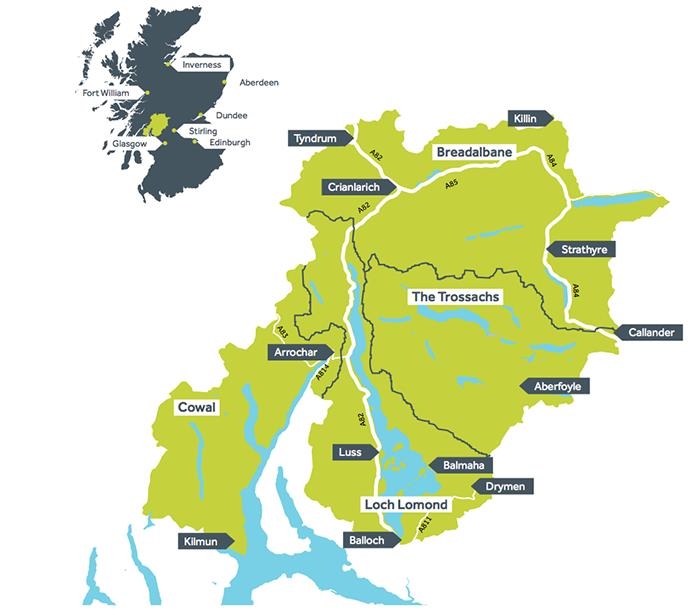New laws being introduced as of 1st March 2017 will change the way people camp and enjoy the park. The new regulations will manage pressures and damage caused by camping and fire lighting in less than four per cent of the National Park. However, this isn’t all bad news for campers, the Park Authority has provided over 300 camping and motorhome places in the byelaw zones bookable through a new website.
Gordon Watson, Chief Executive of Loch Lomond & The Trossachs National Park, said: “Camping is one of the best ways to get out and enjoy the stunning surroundings we have in the National Park and there is every kind of camping experience on offer here. The new byelaws do not change that. Whether you’re an experienced camper, coming on your own or with your friends and family, there is still a wide choice of places to camp in the National Park. To support this we have opened a new campsite in the Trossachs at Loch Chon and are promoting some excellent locations to ‘wild camp’ with a permit…Our focus just now is on making everyone coming to camp in the Park fully aware of how the byelaws work and of all the camping options available to them.”Most importantly he added, “for those who love the solitude of ‘wild camping’, the vast majority of the Park’s 720 square miles will experience no change to camping at all.”
So what does all this mean for people who own a campervan or are hiring a camper to explore one of Scotland. We have listed the key points here:
How can I camp at Loch Lomond?- Between March and September people keen to camp or stay overnight in a motorhome or camper at any of the lochshore locations throughout the Park, can do so by buying a camping permit or booking a pitch at a campsite.
- You can view information and purchase a permit from the National Park authority website.
- There are many privately run campsites throughout Loch Lomond, check out The Camping and Caravanning Club website for some of these.
- There are low-cost, informal campsites with bookable pitches, parking, fresh water and toilets at Loch Chon and Loch Lubnaig in the Trossachs.
- There is also a Forestry Enterprise Scotland’s campsite at Sallochy on East Loch Lomond.
- View the map here.
- You don’t have to go to a campsite, you can still wild camp.
- The byelaws have created four Camping Management Zones which will be in place from March to September
- To camp in these zones visitors will need to have a valid permit.
- Yes, you do still need to purchase a valid camping permit from the National Park Authority website to stay anywhere overnight within these zones – including campsites.
- Camping permits cost £3 per tent, motorhome or campervan per night.
- Permits can be booked online up to eight weeks in advance.
- On the National Park Authority Website
- Loch Chon campsite costs £7 per adult per night.
- Under 16s going free.
- Most laybys are regulated by roads authorities and are not affected by the new camping management byelaws.
- This means you are still able to camp in these laybys
- A small number of laybys within the Camping Management Zones are regulated by the National Park. These particular areas will be clearly marked with signage informing the visitor. Anyone can stop and rest in these laybys during the day but cannot sleep overnight in the vehicle.
- Where you are able to sleep in a layby overnight these will be clearly marked with signage. Please remember you will need to have purchased a permit.
- Permits for staying overnight in these spaces should be booked online in advance at www.lochlomond-trossachs.org/camping.
- If you have a fire when you are camping it should be small, under control, and you should bring your own firewood.
- Causing damage such as chopping trees for firewood is also a breach of the byelaws.
- In extreme cases a fine of up to £500 can be issued.
- Loch Lomond is one of the most popular tourist locations in Scotland. It is also an extremely important area of natural beauty that needs to be protected.
- The volume of campers combined with antisocial behavior from a small number of campers has hugely damaging effect on the environment as well as a negative impact on visitors and the local community.
- The aim of these new rules is to make sure the Loch Lomond continues to be somewhere people can enjoy now and in the future.

